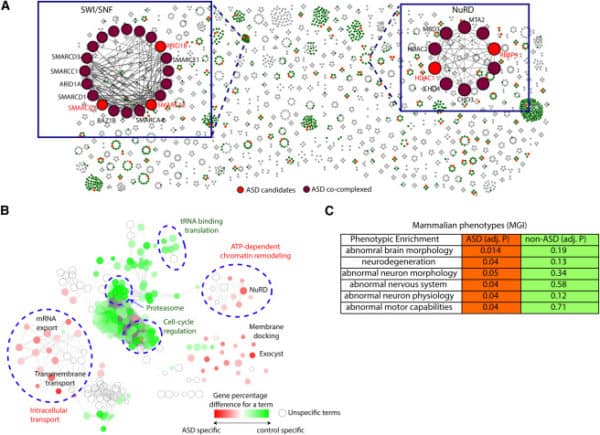
 University of Regina autism research may lead to the devolpment of treatments for autism that are based on targeting genes specific to the condition.
University of Regina autism research may lead to the devolpment of treatments for autism that are based on targeting genes specific to the condition.
Dr. Mohan Babu, an assistant professor in the Department of Biochemistry and principle investigator of the University of Regina’s Babu Lab, partnered with researchers from California’s Stanford University to examine the way genes associated with autism interact with the brain.
The researchers say the prevalence of autism spectrum disorders is growing rapidly, yet its molecular basis is still poorly understood. They sought to better understand autism candidate genes by mapping them onto ubiquitous human protein complexes.
The resultant study, “Identification of Human Neuronal Protein Complexes Reveals Biochemical Activities and Convergent Mechanisms of Action in Autism Spectrum Disorders” was published recently in the journal Cell Systems. Babu says the researchers, who examined the gentic sequencing of 500 subjects, found that genes that are mutated or abolished hampered the function of some cells, leading to disease.
“We were able to identify some core interactions, how well they are actually rewired with autism spectrum disorder,” he said. “This is a very important finding because once you know what interactions are there, we can actually target for therapeutics.”
Despite dubious claims from some that there is an increase in autism due to vaccines, others believe we are seeing a rise in the disorder due to a shift in the way we diagnose it, and that the numbers are rising because many previously diagnosed with an “intellectual disability” are now being placed in the autism camp.
Autism is a neurodevelopmental disorder that is characterized by impaired social interaction and repetitive behavior. The condition is notoriously difficult to diagnose and many parents do not receive an authoritative diagnosis until their child is two years old. While there is no known cure for autism, there are factors that most agree heighten the risk for the condition, including prescription drugs valproic acid and thalidomide taken during pregnancy, certain chromosomal conditions, and parents having children at a later age.
In 2014, the U.S. Centers for Disease Control and Prevention estimated that One in 68 children in that country has had an autism spectrum disorder, a 30 per cent increase from 1 in 88 in 2012. The condition is far more prevalent in boys than in girls, affecting one in 42 boys and just one in 189 girls.
Despite dubious claims from some that there is an increase in autism due to vaccines, others believe we are seeing a rise in the disorder due to a shift in the way we diagnose it, and that the numbers are rising because many previously diagnosed with an “intellectual disability” are now being placed in the autism camp.
“If you asked me, ‘Is there a real increase in the prevalence of autism?’ maybe there is, but probably much lower than the reported magnitude,” says Santhosh Girirajan, a geneticist at Pennsylvania State University.
Babu says he hopes the next step will see him applying the research to mice, a move he thinks could be an important one in the journey towards a potential treatment.
“Once we understand the behaviour patterns of the mouse we can move into the clinical side of it,” he said.
Leave a Reply
You must be logged in to post a comment.



 Share
Share Tweet
Tweet Share
Share




Comment